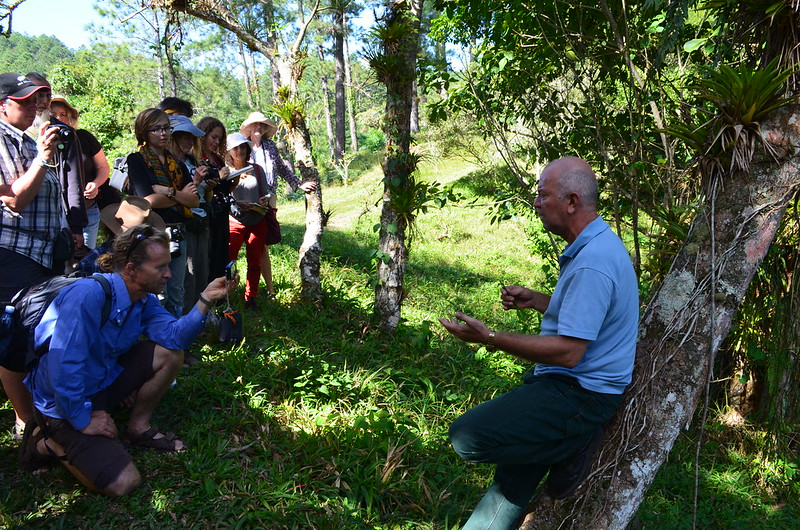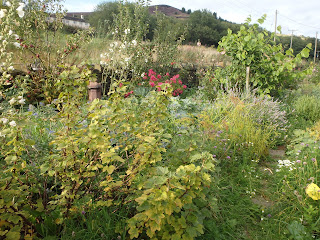
Forest gardens are multi-storey polycultures producing a great variety of yields including food, fuel, fibre, medicine, building materials and others.
Other benefits extend to biodiversity, water and soil retention, carbon storage, food self-reliance, education and social cohesion. We are researching forest gardens so we can find out how to optimise these benefits.
The 10-year Forest Garden Trial
In 2009 the Association received funding to run a ten-year forest garden trial. Eleven projects that were in the process of setting up forest gardens were recruited. The project has now been completed and you can read the Executive Summary and download the full report here!
Baseline data was collected and a small amount of funding provided to each project towards set-up costs. The research focussed on yields, which has been interpreted to include economic, social and bio-diversity yields as well as actual crops harvested.
Enough data has been gathered to enable more tightly focussed research questions to be framed, and to allow the development of a larger scale project with academic partners which involves more forest gardens. So far, three areas of particular interest have emerged and seems worthy of further study:
► The ratio between energy put into the forest garden and the energy yield
► Making a living from forest gardening
► The potential of forest gardens in amenity horticulture
3 year report (2013)
The year 3 report of the project is available via the link below.
5 year report (2015)
This report, complied by Silvio Volkmann, marks the half way point of the project. It reports on the progress of the forest gardens in the trial, and on what has been learned to date. Read it here.
10 year report (2021)
Karina Ponton of Bangor Univeristy spent much of 2021 interviewing and visiting the trial sites and is now writing up the final stage of this project. We are very grateful to her for her efforts, and will be sharing her report here in 2022.
Forest Garden Baseline survey
In 2013, Tomas Remiarz (in collaboration with the Association and Permanent Publications) undertook the first comprehensive survey of temperate forest gardens to establish a baseline for further research. Over 100 responses from across Europe and North America helped us to see an emerging picture of the diversity of forest gardens. The initial report of the survey is available via the link below. In 2016-17 we conducted a second, improved version of the survey, adding over 100 more sites to our database. These surveys have now been written up and we are currently (2021) hoping to get them published soon. Researchers who want access to this database of over 250 temperate forest gardens for genuine research purposes should email [email protected]
Visit a forest garden
Participants in our ten year trial:
Edibles, West Yorkshire, www.edibles.org.uk
The Oak Tree Low Carbon Farm, Suffolk, www.the-oak-tree.co.uk
Stepney City Farm, London, www.stepneycityfarm.org
Vallis Veg, Somerset, www.vallisveg.co.uk
Kerswell, Devon, no website, but see https://thebuddhistcentre.com/clear-vision/forest-garden
A few other fantastic forest gardens:
Lydford Forest Gardens, Somerset, www.lydford-forest-gardens.com
Forest Garden Shovelstrode, Sussex, www.forestgarden.info/
Old Sleningford Farm, North Yorkshire, www.oldsleningford.co.uk/ForestGarden.html
Karuna Permaculture Project, Shropshire, www.karuna.org.uk
Garden Cottage, Coldstream, Scottish Borders, https://grahambell.org/